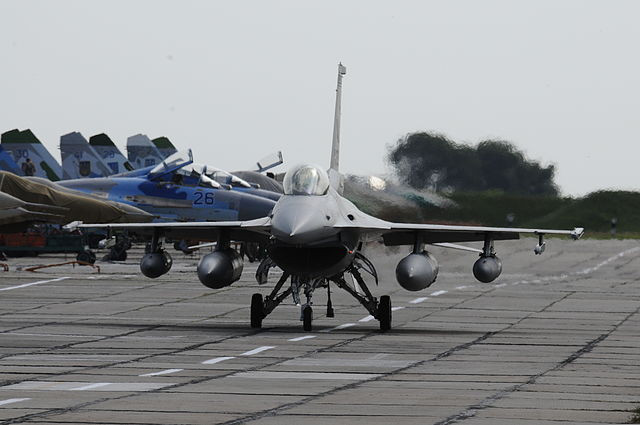A Ukrainian F-16 fighter pilot was killed Sunday while defending against one of Russia's largest aerial assaults since the war began, according to Ukraine's military. The pilot, identified as 1st Class Lt. Col. Maksym Ustymenko, was credited with downing seven air targets before his jet was hit and crashed. He was unable to eject.
The Ukrainian air force said Ustymenko "did everything he could to steer the aircraft away from a populated area, but he did not have time to eject." His death marks the third F-16 pilot and fourth F-16 aircraft lost since Ukraine began operating the U.S.-made jets last year.
President Volodymyr Zelensky said Russia launched 477 drones and 60 missiles overnight, targeting at least six regions across Ukraine. "This war must be brought to an end - pressure on the aggressor is needed, and so is protection," Zelensky said in a post on X. "Ukraine needs to strengthen its air defence - the thing that best protects lives."
The Ukrainian military reported shooting down 211 drones and 38 missiles. Another 225 drones were either disabled via electronic warfare or served as unarmed decoys. Russia claimed its strikes targeted military-industrial sites and oil refineries, though Ukrainian officials reported damage to civilian infrastructure.
At least 11 people, including two children, were injured in a strike on the central city of Smila, where three apartment buildings, private homes, educational institutions, and a psychiatric hospital were damaged, said Ihor Taburets, head of the Cherkasy regional military administration.
Explosions were reported in Kyiv, Lviv, Poltava, Mykolaiv, Dnipropetrovsk, Cherkasy, and Ivano-Frankivsk. In Kyiv, residents sought shelter in metro stations amid machine-gun fire and missile interception blasts. In Lviv, attacks on infrastructure near the Polish border marked an escalation in a region typically less affected by nightly barrages.
Zelensky renewed his call for Western allies to supply additional air defense systems, including U.S.-made Patriots. Ukraine was ready to buy American systems, he said, appealing directly to President Donald Trump's administration, which has not yet authorized further military assistance. Trump told reporters he was considering the Patriot request following a NATO summit last week.
Ukraine reportedly possesses about six Patriot batteries, though exact figures remain classified. These systems are critical to protecting cities from ballistic and hypersonic missiles, but Kyiv is reportedly facing shortages of interceptor missiles.
The attacks come amid Ukraine's withdrawal from the Ottawa Treaty, which bans anti-personnel landmines. Zelensky signed a decree on Sunday to leave the pact, with parliamentary approval still pending. The move reflects Kyiv's growing frustration with what it sees as asymmetric warfare. "Russia is not a party to this Convention and uses mines against our military and civilians on a massive scale," said Roman Kostenko, a member of Ukraine's Parliament.
According to the United Nations, Ukraine is now the most heavily mined country in the world. Human Rights Watch reported last year that both Russia and Ukraine have used landmines during the war. The Biden administration authorized landmine shipments to Ukraine in late 2023.
The Ukrainian Foreign Ministry called the decision to withdraw from the treaty a "difficult but necessary political decision." Several neighboring NATO states including Finland, Poland, Latvia, Estonia, and Lithuania have also questioned their obligations under the Ottawa Convention, citing national security needs.
Sunday's attacks underscore the scale and frequency of Russia's evolving tactics. In the past week alone, Russia launched over 1,270 drones, 114 missiles, and nearly 1,100 glide bombs, according to Zelensky. "Moscow will not stop as long as it has the capability to launch massive strikes," he said.






